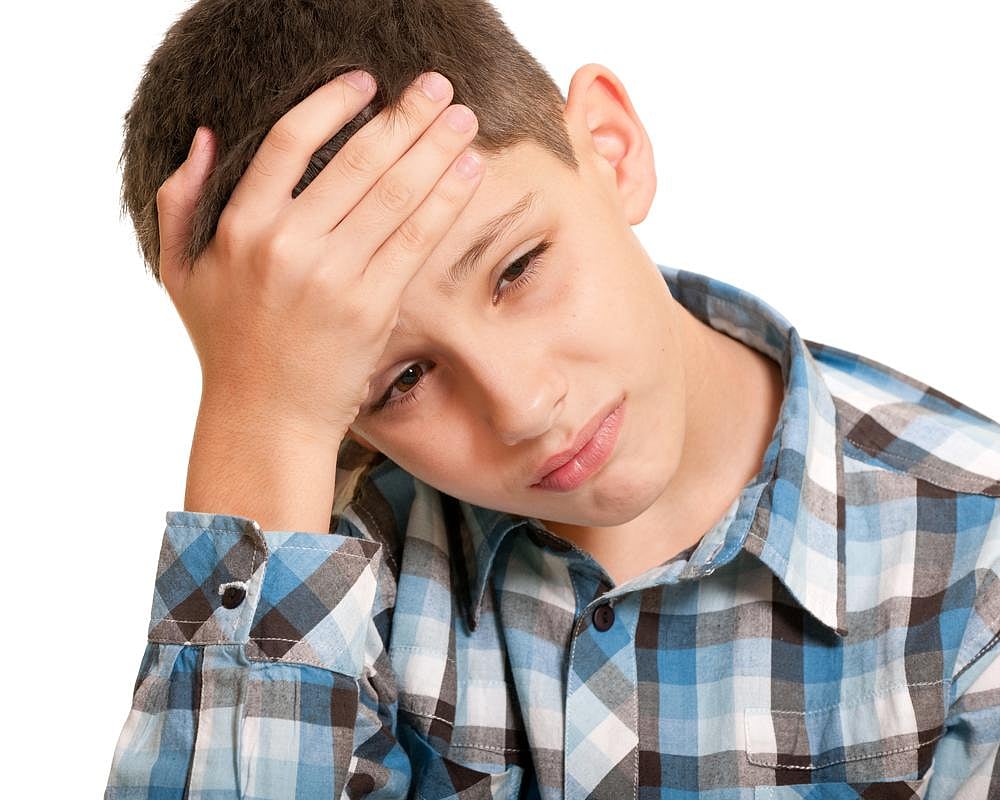Headaches in Children

Most people think of headaches as an adult problem, but kids can get them too. Often, childhood headaches are just temporary symptoms of a cold, flu, or an an infection of the sinuses, eyes, or ears. But like adults, some children can get tension headaches, migraines, or other recurring type of head pain. If your child has mild headaches every once in awhile but seems otherwise healthy, there's nothing to worry about. But severe, frequent headaches obviously demand attention.
Here are some types of headaches to watch out for:
Tension headaches. This common type of headache causes a dull ache on one side of the head. As with adults, tension headaches in kids can be brought on by stress, anxiety, or depression. They may flare up on school days and disappear over the weekend or during vacation.
Migraines. Although they usually don't strike before children reach school, migraines can show up at any age. Its estimated that about one school-age child out of 20 has had at least one migraine, a severe, pounding headache that last from two hours to two or three days and is often accompanied by nausea and vomiting, abdominal pain and a desire to seek relief through sleep. Often, the headaches stop before children reach puberty. Young children with migraines might have pain on both sides of their head, while older children usually have it on one side. Like adults, kids with migraines may see auras (distorted visions) before the headache starts.
Cluster headaches. These headaches are relatively common in teenagers, especially boys. As the name suggests, the pain comes in bunches. Each attack starts around the eye and then spreads outwards. The eye may become swollen and watery, and the face will probably turn red.
Meningitis. A child with meningitis will have many other symptoms beyond an excruciating headache. Inflammation of the brain covering can also cause high fever, vomiting, sensitivity to light, and extreme stiffness in the neck (sometimes accompanied by an inability to touch the chin to the chest). Other signs include listlessness and irritability. If you think your child might have meningitis, call 911 or get medical care immediately.
What can I do about my child's headaches?
You might be able to prevent some headaches in the first place by encouraging your child to get regular exercise and drink plenty of fluids. If your child suffers from tension headaches or migraines, you should find out if something is upsetting her. She may need extra help coping with her problems, perhaps including a visit with a counselor.
Children with migraines also need to learn how to identify and avoid the triggers that can set off their headaches. Different people can have different triggers, but possible culprits include excessive exposure to the sun, bright lights, heavy exercise, and certain foods, including lunch meats, MSG, and aged cheese.
Most childhood headaches can be treated with an an over-the-counter pain reliever such as ibuprofen or acetaminophen. (Children under 16 shouldn't take aspirin unless it's recommended by a doctor.) Don't let your child take more than a few pills a week. For extra relief, put a cold pack or cool compress on his head or gently massage your child's shoulders and the back of her neck. Encourage him to lie down in a quiet, dark room until the pain goes away or gets better.
Should my child see a doctor?
If your child's headaches are extreme and keep coming back, you should definitely schedule and appointment with her doctor. A doctor can help identify the type of headache and come up with a treatment plan, perhaps including prescription drugs. Talk to your doctors about possible side efforts, however. At least one migraine medication approved for children could raise the risk of serotonin syndrome if children are also taking antidepressants known as SSRIs or SNRIs. People taking the drugs in combination can experience hallucinations, fast heart beat, nausea and vomiting, seizures, and sudden changes in blood pressure, and it can be fatal if not treated.
References
U.S. Food and Drug Administration. Axert: Highlights of prescribing information.
Serotonin syndrome. Mayo Clinic.
American Headache Society. Headaches in children. http://www.achenet.org/education/patients/HeadachesinChildren.asp
American Academy of Family Physicians. Migraine Headache in Children and Adolescents. http://familydoctor.org/757.xml
Gladstone JP et al. Migraine in special populations. Postgraduate Medicine. Volume 115, Number 4. http://www.postgradmed.com/issues/2004/04_04/gladstone.htm
U.S. Food and Drug Administration. Antidepressant Use in Children, Adolescents, and Adults. http://www.fda.gov/cder/drug/antidepressants/default.htm
Related Posts
COPD: Causes, Symptoms & Treatments
WEDNESDAY, May 10, 2023 (HealthDay News) -- Finding out that you or a loved one...
With Holidays Ahead, COVID Boosters a Must for People With Weak Immune Systems
SUNDAY, Dec. 5, 2021 (HealthDay News) -- If you're a patient with a weakened...
Uno de cada 36 niños de 8 años de EE. UU. tiene autismo
JUEVES, 23 de marzo de 2023 (HealthDay News) -- Más niños estadounidenses tienen...
Odds of Poor Vision Increased for Black, Mexican, Low-Income Teens
FRIDAY, Sept. 16, 2022 (HealthDay News) -- Adolescent children who are Black,...
